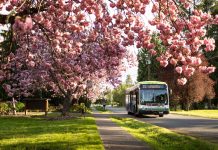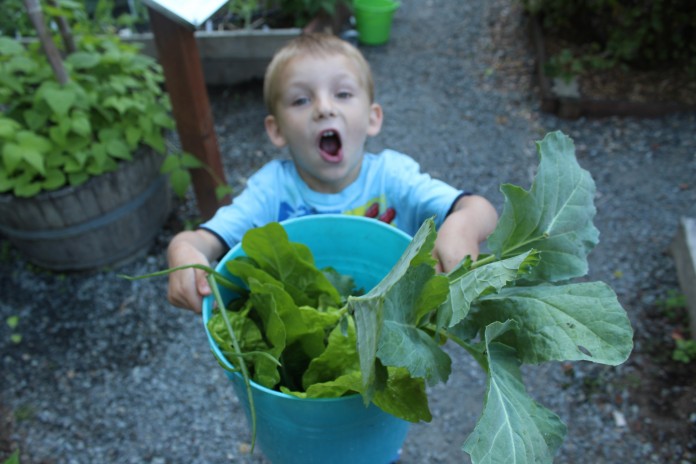By Eric Belgau
 This story begins at the end, with my daughter, Franny – age 6 – coming into the house with a bunch of freshly picked tomatoes from our garden and asking if she can donate them to the Thurston County Food Bank. I blame the fairies.
This story begins at the end, with my daughter, Franny – age 6 – coming into the house with a bunch of freshly picked tomatoes from our garden and asking if she can donate them to the Thurston County Food Bank. I blame the fairies.
Every year, the Master Gardeners of Thurston County run a Children’s Garden at Yauger Park’s Dirt Works community garden. For eight weeks, participants in this free program learn about everything from beneficial critters to compost and spend an hour a week harvesting food from the demonstration garden. The Master Gardeners donate that food to the Thurston County Food Bank, providing a steady stream of high-quality, garden-fresh fruits and vegetables to needy families in our area.
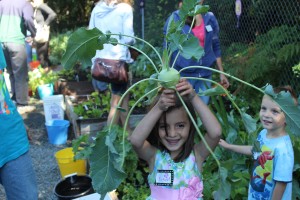
If my kids are any indication, the students jump in with both dirty feet.
The classes themselves are as fun as play time, something the program’s organizers make a top priority. Months in advance, volunteers begin planning games, craft projects, lessons, and even opportunities to dress up in costumes. The results speak for themselves. Whether it’s origami in the garden or a class about snakes (which my son Stephen, age five, talked about for weeks), the sessions blend learning with doing, keeping kids engaged while enriching their knowledge of both horticulture and health.
The class about Fairies, Franny’s favorite, made the garden magical. We now have an elaborate fairy home under our fig tree, where real live fairies are, presumably, very happy.
But it’s the focus on produce – and production – that makes the program so special, and will keep us coming back summer after summer. Harvest time at the Children’s Garden is full of excitement. The discovery of a bean, hidden behind leaves, thrills even the older students when the pods first begin to appear. When a big beet (or carrot, or radish) comes out of the ground, it’s cause for celebration. And pulling a kohlrabi makes the younger kids swell with accomplishment.
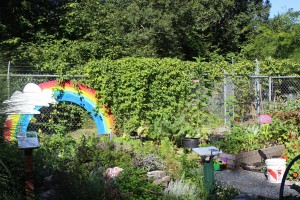
The harvest buckets fill with lettuce heads and kale, root veggies, cucumbers, those sometimes-elusive beans – even edible flowers like borage and geranium. When one reaches the brim, students jockey for the privilege of carrying it over to the harvest table where volunteers sort, weigh, and package everything, preparing it for the Food Bank.
Then it’s watering time. Students play with the two greatest toys ever invented: water and dirt. They run around with watering cans, saturating the garden beds, while volunteers pass out pointers –“water the roots, not the leaves” – that benefit even the adult novice gardeners who stand watching nearby.
In this year of hot weather and record-breaking harvests, the Children’s Garden grew 900 pounds of produce for the Food Bank. That’s high-quality nutrition, something the beneficiaries of assistance programs often don’t see. The value of that contribution isn’t lost on the children who participate. It gives them a sense of community. They earn a sense of accomplishment. They become smarter around the table at home.
The Master Gardeners benefit as well. A “Master Gardener” is a community volunteer, trained through the WSU extension to educate their communities about land stewardship, sustainable practices, and the health benefits of gardening. By participating in the program, Master Gardener volunteers gain access to the WSU knowledge bank, a premier agricultural resource that helps them become better gardeners – and better teachers.
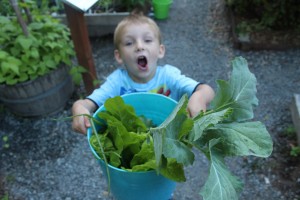
It’s all about cultivation, whether it be of plants, people, or whole communities.
These volunteers are active in the community throughout the year. Thurston County Master Gardeners operate three demonstration gardens – Dirt Works at Yauger Park, the Demonstration Garden at the Olympia Farmers Market, and Closed Loop Park at the Thurston County Landfill. Volunteers staff clinics at the Olympia Farmers Market, Lacey Community Market, and at the Master Gardener office located just off Highway 101 on Harrison Blvd in West Olympia. And a wide range of classes are available year round, from planting and cultivation tips to composting.
Next year, the Children’s Garden will be up and running once again in July and August, cultivating a new batch of future gardeners and a new harvest for the community. As Cindy Cartwright, who facilitates the activities says, “All of us who help make this happen consider it a great honor and privilege to garden with children. They are, after all, the gardeners of tomorrow.”
Check the ThurstonTalk events calendar or go to the Master Gardeners homepage for all upcoming Master Gardener events. If you’re interested in becoming a master gardener, click here. And to keep up to date on events planned for next year’s Children’s Garden, check this page regularly.









